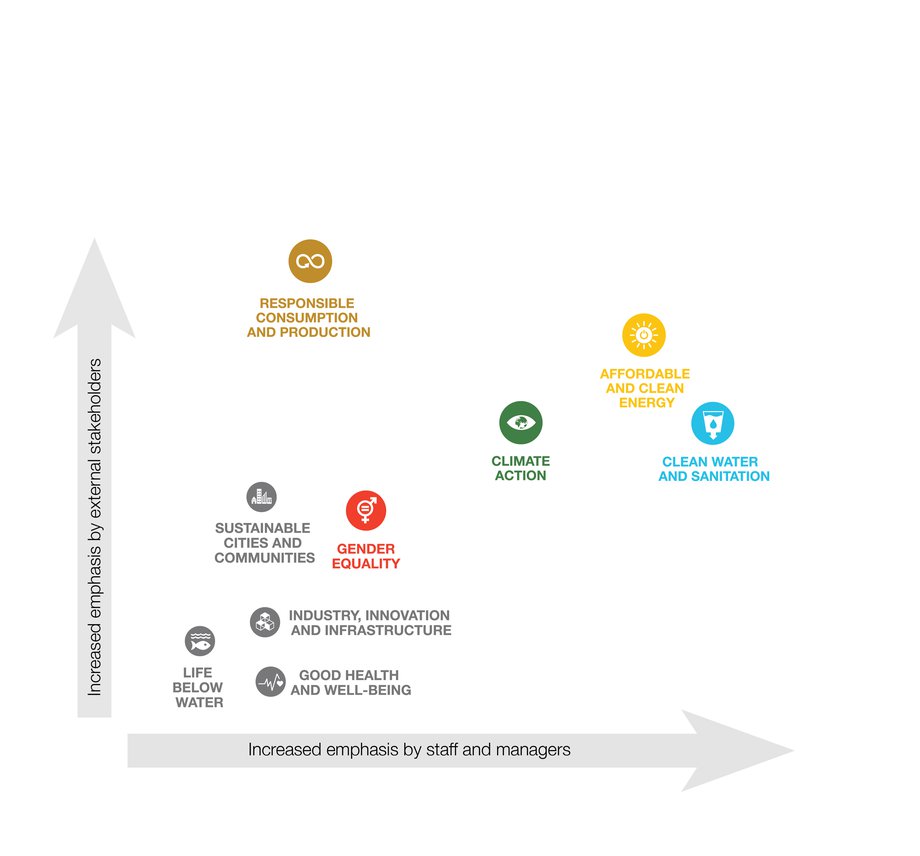5 Gender equality
Gender equality is a human rights issue that aims to value individuals on merit, which is fundamental for sustainable operations.
In accordance with the guidelines of the United Nations and recommendations of the Icelandic government, Reykjavik Energy Group has prioritised the United Nation's Sustainable Development Goals (SDGs), and emphasises five of them in its operations.
The five SDGs were discussed in four steering committees: One with managers from the Group, two with employees from the Group, and one with external stakeholders. The last one included representatives from public institutions, large suppliers of goods and services, large customers, contractors and trade unions.
The steering committees ranked the SDGs, both with respect to where Reykjavik Energy Group could positively impact the progress of these goals, and where its operations could possibly impede them. The Board of Directors of Reykjavik Energy Group agreed that the Group's policy, that emphasis social responsibility, would take note of the conclusion of the steering committees, resulting in the focus being on these five SDGs.
Reykjavik Energy Group's Board of Directors' regular review of all mutual policy documents will use these five SDGs as a frame of reference.


5 Gender equality
Gender equality is a human rights issue that aims to value individuals on merit, which is fundamental for sustainable operations.

6 Clean water and sanitation
Acquisition and distribution of water for consumption, fire fighting and the operation of sewerage are part of Reykjavik Energy Group's core activities.

7 Affordable and clean energy
Sustainable generation and distribution of electricity and heat are part of Reykjavik Energy Group's core activities.

12 Responsible consumption and production
Responsible procurement and reduction of waste are crucial for Reykjavik Energy Group to be able to fulfil its core activities.

13 Climate action
Focused climate action is an essential part of all business activities.
The Boards of Directors of two of RE's subsidiaries have prioritised UN's SDGs with respect to each company's operations.
Reykjavik Energy works to promote SDG 4’s Target 4.1, which is: By 2030, ensure that all girls and boys complete free, equitable and quality primary and secondary education leading to relevant and effective learning outcomes. This indicator is prioritized by the Icelandic government..
Reykjavik Energy works to promote SDG 4’s Target 4.4, which is: By 2030, substantially increase the number of youth and adults who have relevant skills, including technical and vocational skills, for employment, decent jobs and entrepreneurship. This indicator is prioritized by the Icelandic government..
Reykjavik Energy works to promote SDG 13’s Target 13.1, which is: Strengthen resilience and adaptive capacity to climate-related hazards and natural disasters in all countries.
Reykjavik Energy works to promote SDG 13’s Target 13.3, which is: Improve education, awareness-raising and human and institutional capacity on climate change mitigation, adaptation, impact reduction and early warning.
Reykjavik Energy works to promote SDG 14’s Target 14.1, which is: By 2025, prevent and significantly reduce marine pollution of all kinds, in particular from land-based activities, including marine debris and nutrient pollution. This indicator is prioritized by the Icelandic government..
Reykjavik Energy works to promote SDG 15’s Target 15.3, which is: By 2030, combat desertification, restore degraded land and soil, including land affected by desertification, drought and floods, and strive to achieve a land degradation-neutral world. This indicator is prioritized by the Icelandic government..
Reykjavik Energy works to promote SDG 17’s Target 17.6, which is: Enhance North-South, South-South and triangular regional and international cooperation on and access to science, technology and innovation and enhance knowledge sharing on mutually agreed terms, including through improved coordination among existing mechanisms, in particular at the United Nations level, and through a global technology facilitation mechanism.
